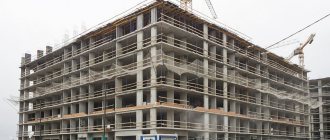Contents of the statute of a housing cooperative
Article 52 of the Civil Code determines that a legal entity such as a housing or housing-construction cooperative carries out its activities on the basis of a statute, which must be ratified by a decision of the meeting of founders. According to Article 113 of the Housing Code of Russia, the standard charter of a housing construction cooperative must contain:
- the name of the cooperative, which must include the word “cooperative” and indicate the key purpose of its creation;
- the location of the legal entity, which corresponds to the place of its state registration;
- in what order the structure’s activities are managed;
- goals, objectives and subject of activity;
- the amount of share contributions that must be made by members, the system for making these contributions and liability in case of non-compliance with the obligations to make them;
- the structure and level of competence of management bodies, and the procedure according to which they make decisions, including problems on which decisions are made by a qualified majority or unanimously;
- the procedure by which compensation for losses incurred by members of the organization is carried out.
The statute may include other provisions that do not contradict the law if they are related to the specifics of the activities of a particular legal entity.
What is the charter of housing cooperatives?
The activities of residential complexes and housing cooperatives are regulated by the legislation of the Russian Federation. Chapter 11 of the Housing Code is entirely devoted to the functioning of such associations. In accordance with it, housing and housing-construction cooperatives must undergo state registration to carry out legal work. At the same time, they will be registered as legal entities (Article 114 of the RF Housing Code).
Any legal entity acts on the basis of a charter (Article 52 of the Civil Code of the Russian Federation). Therefore, this is a mandatory document for residential complexes and housing cooperatives. It is constituent, which means it is necessary when carrying out state registration of citizens' cooperatives.
The main role of a model charter is to set out the rules governing the activities of the organization. The document defines:
- The purpose of creating a cooperative.
- Main activity.
- Rules for membership in the organization.
- The mechanism of settlements within the association and payment of membership fees.
- Management authority.
Information: the charter of residential complexes and housing cooperatives is approved by the meeting of founders. They can be persons wishing to organize a cooperative. The decision to create an association and approve its charter is made by a general vote of citizens intending to join the cooperative (Article 112 of the Housing Code of the Russian Federation).
We talked about whether it is worth joining housing cooperatives and what the pros and cons of such organizations are here.
Based on the created document, members of the association will subsequently be able to manage the construction of an apartment building (if it is a housing cooperative), organize its reconstruction and participate in the maintenance of the building.
Requirements for the statute of a housing cooperative
A housing cooperative whose statute does not comply with current Russian legislation does not have the right to carry out activities on a full scale. It is important to clearly define what requirements for the statute of a housing cooperative are put forward in existing legislative acts: 1. Article 52 of the Civil Code determines that the charter of a legal entity, which includes a housing cooperative, must include:
- information about its name;
- its location;
- subject of activity and key goals.
2. Article 116 of the Civil Code determines that the charter must contain information about:
- the procedure for inclusion in members of the organization;
- the amount of contributions, both entrance and share, their structure and mode of payment;
- the procedure for convening a conference (general meeting) of members of a housing cooperative;
- the level of liability that follows as a result of failure to fulfill obligations to pay contributions;
- the procedure for leaving such an organization and paying the share contribution that was made at the time of leaving, as well as compensation of another nature;
- the procedure for compensation for losses incurred by members of such a structure;
- the procedure within which the reorganization or complete liquidation of the structure occurs.
3. Paragraph 2 of Article 115 of the Russian Housing Code establishes the need to indicate in the statute the procedure for holding a general meeting.
4. Article 118 of the LC determines that the charter must reflect:
- the procedure for selecting members of the board, the number of such body and the period of its operation;
- the procedure for the management board to carry out its activities.
5. Article 119 of the Housing Code stipulates the need to indicate the period of authority of the head of the board.
6. Article 120 of the LC obliges to indicate the quantitative composition of the audit commission, and in addition the procedure for carrying out activities by this body or the auditor.
7. Article 128 of the Housing Code states that the charter defines a system for providing housing (renting out) for a fee, which became vacant as a result of the withdrawal or expulsion of their former owners from the cooperative until new members were admitted to the organization.
8. Article 130 of the LC indicates the need to prescribe in the charter the procedure within which the consideration of requests from members of the organization to leave at their own request will take place.
When preparing the statute of a housing cooperative, it is important to understand the specifics of each section. So, when describing the subject and purpose of operation, it is necessary to concentrate on the fact that the housing cooperative is endowed with special, rather than general legal capacity, which is typical for all non-profit institutions. Therefore, this structure can implement such activities, which are referenced in the constituent documentation and which correspond to the subject and goals that are stated in this documentation.
Protocol on the creation of a housing cooperative
The minutes of the first constituent meeting is another important paper required during legal registration. faces. There is a certain procedure for its maintenance, which is clearly visible in copies of this protocol.
Since 2014, this sample has undergone some changes in the design of the meeting of legal entities and the very content of the first constituent meeting has changed. All necessary papers with the Protocol and application in the required form are provided to the registration structures.
The first protocol contains information about the creation of the enterprise, name, authorized capital, composition of the founders and their shares in the capital. The first constituent protocol reserves the fact of choosing a leader.
The minutes contain information about the agenda that is important for the formalization of the organization.
All founders now become applicants , which means that everyone signs an application in form P11001 at the notary.
And the document indicates one founder who is responsible for government registration and payment of fees.
All shareholders are required to be present when submitting a package of documents to the Federal Tax Service or give permission to the representative certified by a notary to submit and receive documents.
Membership and fees
As for membership, members of the cooperative can be individuals who are over 16 years old, as well as legal entities. The number of members cannot be less than five, but at the same time their number should not be higher than the number of residential premises available in the apartment building that is being built or purchased by the cooperative. The application for membership is considered by the board within 30 days and must be approved by a protocol decision of the general meeting. A person is a member of a housing cooperative from the date of payment of the entrance fee, but only after the general meeting has approved the corresponding decision on the membership of this person.
Contributions are paid by the members of the cooperative according to the rules established by the statute; this can be done by making a lump sum payment or in installments.
Until the full amount of the share contribution is paid, the dwelling for which payment is being made remains the property of the cooperative. It is important to know that an apartment building is the property of the cooperative until at least one of its members makes the full share contribution. After this, the cooperative turns into a structure that manages an apartment building.
The statute must stipulate what liability members bear in case of violation of their obligations to pay contributions, including failure to meet deadlines for depositing funds.
The appearance of a new edition of the paper
To adopt a new edition of the paper, members of the general meeting should be convened. In this regard, the general provisions of the Charter are identified for reasons of modification, and as a result a fresh version is adopted. The latest edition affected Article 20, related to the reduction of the authorized capital.
A fresh edition of the Charter is required to eliminate disputes over the newly emerged laws of the Civil Code and the Housing Code. The date of adoption of the new document means the loss of validity of the old one.
Important! The updated release of the Charter must be approved with mandatory legal force.
After making amendments, no more than three days are given for filing with the tax service , during which you should prepare:
- a copy of the latest Charter document;
- original and copy of the new edition of the document;
- a copy of the minutes from the meeting where the decision on the new edition was made;
- form P13001 or P13002.
Speaking about introducing the latest clarification to the Charter, this nuance is approved in a special notice. The latter should include the place and title of the approval, the initial amount of the authorized capital and by how much it will be reduced and how, as well as consideration of the scheme and terms of the application of the cooperative creditor.
Controls
The general meeting is recognized as the highest management body of the cooperative and its meetings must be held at least once every 12 months. In fact, the general meeting of housing cooperatives is convened more often. This is facilitated, for example, by the need to officially approve all new members, as well as to carry out expulsion from membership. Taking this into account, the charter often provides for the possibility of conducting the voting process in absentia.
The charter of the cooperative determines the order in which the general meeting should be convened, the terms and methods of informing its members about the holding of the next meeting, the procedure for counting votes and notifying members of decisions made. To recognize the general meeting (conference) as competent, more than 50% of the members must take part in it. Article 117 of the LC establishes that a decision of the general meeting is approved if more than ½ of the members present at it voted for it, but if we are talking about voting on topics that are provided for by the statute of the cooperative, more than ¾ of the members present must vote “for”. The Housing Code defines a list of issues that fall within the competence of the meeting, including:
- holding board elections;
- holding elections for the composition of the audit commission;
- enrollment as a member of a housing cooperative;
- exclusion from its membership;
- issuing a resolution to reorganize the structure;
- carrying out division of premises between members.
Members of the board of a housing cooperative can only be its active members; their number and the period for which they are elected are determined by the charter. The Statute also establishes the functioning of this body and the procedure for making decisions. The board of the cooperative is responsible for managing the ongoing activities of the structure. The head of the board may be one of the members of this body; he is responsible for the implementation of decisions made by the members of the board. He has the right to carry out activities on behalf of the structure without a power of attorney, representing its interests and concluding transactions, as well as to exercise other powers that do not fall within the competence of the board or general meeting of the structure.
The Audit Commission is elected during the general meeting for a period that cannot exceed 3 years. Persons who are included in the audit commission do not have the right to be members of the board or hold other positions in the management bodies of the cooperative.
Main changes and additions introduced by Decree No. 536
Innovations in the activities of the general meeting and the meeting of authorized members of the CU and ZhSPK
Almost all decisions of the general meeting of CU members are now made differently than they were before July 13, 2021. For example, when counting votes, the previous principle of “one CU member - one vote” was replaced by the principle “each CU member has a number of votes proportional to its share in the right of common ownership of the common property of the vehicle.”
The only exceptions are those few cases when either unanimity or a qualified majority (more than 2/3) of the votes of the CU members from their total number is required to make a decision. The bulk of decisions of the supreme governing body are made on the condition that the proposed decision is voted for by members of the CU who have at least 50% of the votes of the total number of votes of all members of the CU.
According to the previous vote counting scheme (more than 50% of the total number of votes of CU members), from July 13, 2021, no decision of the general meeting should be made.
Fundamental changes in the counting of votes also affected the Housing and Communist Party of the Soviet Union.
From July 13, 2021, when making a decision, the percentage of votes cast “for” is calculated not from the number of votes of the members of the housing cooperative present at the general meeting, but from the total number of votes of all members of the housing cooperative (and in some cases also the owners of housing cooperative real estate, not who are its members). A small part of the decisions of the general meeting are adopted, as in the Customs Union, on the principle of “one member of the Housing Society of the Soviet Union - one vote.”
However, in this case, when calculating the percentage of those voting “for”, the basis is not the number of those present at the general meeting, but the total number of all members of the housing cooperative (including or not including non-mandate owners of housing cooperative real estate).
With regard to the procedure for making a decision by the meeting of authorized representatives, a new principle also applies, which is the same for both the Customs Union and the Housing and Social Cooperation Committee: a decision is considered adopted if authorized representatives with at least 50% of the votes of the total number of votes of all authorized representatives vote for it. The number of votes of authorized representatives present at the meeting has no legal significance.
Payment of contribution upon leaving the cooperative
Membership in the cooperative ends when:
- making an independent decision to leave the cooperative;
- using the exclusion procedure;
- liquidation of a legal entity - a member of the structure;
- liquidation of the structure itself;
- death of a person who is a member.
Expulsion of a member is permitted if he grossly fails to fulfill his obligations without a valid reason. This resolution is passed by the general meeting. In this case, the person is paid the amount of the share he contributed in terms and in compliance with the conditions that are prescribed in the statute of the cooperative.
The period during which payment of the deposited amount must be made cannot exceed 60 days from the date of the decision to exclude a member of the housing cooperative.
In such a case, the expelled member, together with representatives of his family, loses the right to use the residential premises and must vacate it within 60 days from the date of the decision to expel. To ensure that the rights of family members of a member of a cooperative who has been expelled are not violated, the charter of the structure must provide for their preferential rights to become members of the organization if they have the finances required to fulfill the obligations to pay a share contribution.
New edition: procedure for making changes
The requirements necessary to change the content of the Charter are specified in the amendments to Federal Law No. 14-FZ of 02/08/1998, adopted on December 29, 2012. According to these amendments, all changes made to the charter document must be approved at a general meeting of members of the cooperative.
The registration authority must be notified of all changes, additions and revisions within 3 days, attaching two copies of the notice of acceptance of the changes and indicating the following information:
- Name in short and full forms, location.
- The size of the authorized capital and its reduced amount.
- Detailed description of the proposed action process.
- Conditions and procedure for application by creditors of the organization.
The charter of the housing cooperative is a binding document. If there is no Charter, the corresponding enterprise itself is missing. It is the charter document that contains all the main details and directions for the functioning of a housing construction cooperative.
Coverage of losses, reorganization and liquidation
Members of the housing cooperative must cover existing losses by depositing additional funds within 3 months after the annual balance is approved. Article 116 of the Civil Code determines that in case of failure to fulfill this obligation, the structure may be liquidated through judicial proceedings.
In cases where all members of the cooperative have paid their share contributions for the housing provided by the cooperative in full, these residential premises become the property of the members of the organization. As a result, the main goal for which the cooperative was created - meeting the housing needs of its members - is being achieved. After this, the cooperative can remain the managing structure if such a decision was made at a general meeting of owners. The second option, which is provided for in Article 122 of the Housing Code, is the reorganization of the structure into a homeowners’ association. A housing cooperative is considered reorganized from the date of state registration of the created HOA.
Author of the article
Merger of residential complex
The reorganization of the cooperative, which is discussed in Article 122 of the Housing Code, comes down not only to the possibility of transforming this organization into a HOA. A merger of a cooperative with another identical organization or accession to it is allowed. Such a decision must also be made by the general meeting, as in the case of transforming a cooperative into a partnership.
Thus, this process implies that two or more cooperatives may decide to form one. Such structures are also called “united cooperatives”.
Affiliation most often involves a small cooperative joining another, larger one that may have been organized earlier.
Such processes are designed to optimize the operation of the housing stock and surrounding areas. In this case, legal succession is also assumed. This implies that the rights and obligations of a cooperative that has ceased its activities are transferred to the newly emerged structure on the basis of a transfer deed.
Consequences of poor preparation of the Charter
Let us briefly outline the possible negative consequences of poor preparation of the Charter:
In accordance with paragraph 1 of Art. 138 of the Housing Code of the Russian Federation, the Homeowners Association is obliged to: ensure compliance with the requirements of the Housing Code of the Russian Federation, the provisions of other federal laws, other regulatory legal acts, as well as the charter of the partnership.
According to clause 3, part 5, art. 20 of the Housing Code of the Russian Federation, officials of state housing supervision bodies, municipal housing control have the right to issue orders to stop violations of mandatory requirements, to eliminate identified violations, to take measures to ensure compliance with mandatory requirements, including elimination within six months from the date of sending such an order inconsistency of the charter of a homeowners' association, housing, housing-construction or other specialized consumer cooperative, amendments made to the charter with mandatory requirements.
For failure to comply with the instructions of the authorized body, administrative liability is provided for the management entity under Art. 19.5 of the Code of Administrative Offenses of the Russian Federation, which provides for the imposition of an administrative fine on officials - from one thousand to two thousand rubles or disqualification for up to three years; for legal entities - from ten thousand to twenty thousand rubles.
In addition, the state housing supervision body, the municipal housing control body has the right to apply to the court for the liquidation of a homeowners association, housing, housing construction or other specialized consumer cooperative in the event of failure to comply within the prescribed period with an order to eliminate the inconsistency of the charter of such a partnership or such cooperative , amendments made to the charter of such a partnership or such a cooperative to the requirements of this Code, or in the event of violations of the procedure for creating such a partnership or such a cooperative, if these violations are of an irreparable nature (Clause 2, Part 6, Article 20 of the Housing Code of the Russian Federation).
Summarizing the above, we come to the conclusion that inconsistency of the Charter or its individual provisions with the current legislation, as well as failure to comply with the instructions of the authorized bodies, may lead to legal proceedings, including litigation on the liquidation of the HOA.






